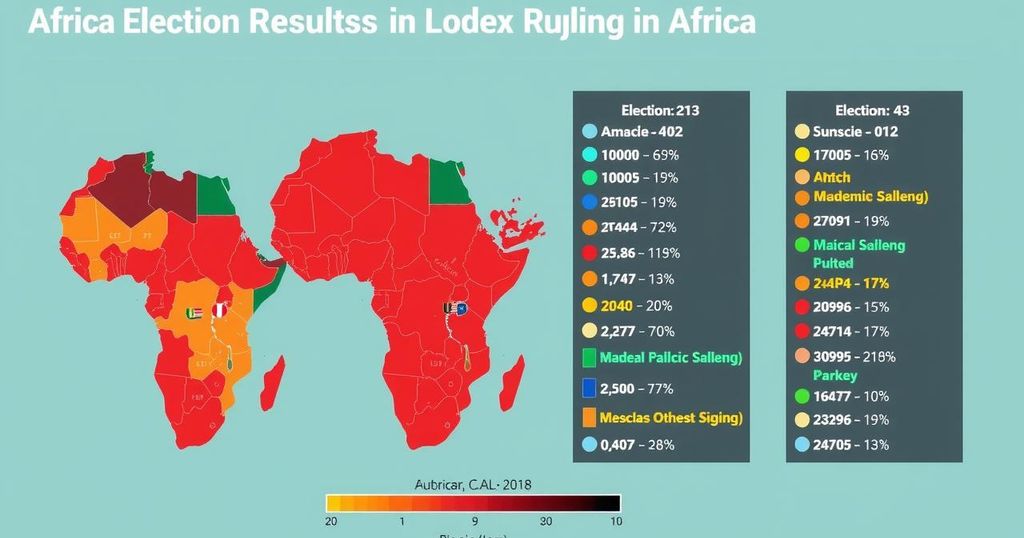2024 African Elections: Insights on Political Shifts and Challenges

In 2024, numerous African nations held elections, with mixed outcomes for ruling parties. Incumbents like Azali Assoumani in Comoros and Frelimo in Mozambique retained power while Botswana saw an opposition leader elected and South Africa’s ANC lost its majority. Rwanda’s Paul Kagame secured near-total votes, while Ghana’s Mahama returned amid economic concerns. Electoral processes faced delays in the Sahel region due to military control.
In 2024, numerous countries across Africa held pivotal elections, reflecting a complex political landscape. While several longstanding ruling parties managed to retain their hold on power, others experienced unexpected defeats. In Comoros, President Azali Assoumani secured a fourth term amidst violent protests from opposition supporters. Mozambique’s Frelimo party continued its tradition of dominance, despite contested election results leading to civil unrest. Alternatively, Namibia’s SWAPO party elected its first female president, Netumbo Nandi-Ndaitwah, though her victory was marred by accusations of electoral misconduct.
Celebrations for democratic changes were evident in Botswana, which elected an opposition leader, Duma Gideon Boko, marking the end of nearly 60 years of single-party rule. South Africa’s African National Congress, facing its own struggles, fell short of a majority for the first time since 1994, necessitating a coalition government. The party’s declining popularity was attributed to persistent issues such as power outages and corruption, prompting calls for significant reform.
President Paul Kagame of Rwanda achieved an almost unanimous electoral victory, with some experts applauding his contributions to national stability post-genocide, while critics raised concerns over democratic practices in the nation. In Ghana, former President John Mahama returned to power, emphasizing economic recovery in light of a challenging fiscal landscape. Senegal saw the rise of Bassirou Diomaye Faye, the youngest elected president, who promised to combat corruption and foster unity.
Conversely, in the Sahel region, elections were postponed, indicating the military juntas’ intentions to reinforce their authority without electoral accountability. These developments illustrate a multifaceted reality in African politics, wherein both continuity and change coexist amidst an evolving democratic framework.
The 2024 elections in Africa provided critical insights into the continent’s political dynamics, showcasing various outcomes ranging from the retention of power by established regimes to the emergence of new leaderships. This juxtaposition reveals underlying tensions between democratic aspirations and entrenched political practices. Observers noted significant influences, including economic conditions and governance issues, impacting voter perceptions and choices. Moreover, the ongoing struggles in the Sahel region further complicate the narrative of democratic evolution in Africa, highlighting the challenges faced by nations transitioning from military rule to civil governance.
The 2024 African elections demonstrated a landscape characterized by a blend of resilience and resistance among political actors. While some incumbents maintained their positions, the emergence of new leaders in countries like Botswana and Senegal signifies shifting political tides. The contrasting situations in regions like the Sahel, where elections were delayed, raise concerns about the future of democracy. Overall, these elections underline the struggle for effective governance in Africa amid varying socio-political pressures.
Original Source: www.voanews.com







